by Zipbooks Admin
Voice search optimization: Myth vs Reality

Comscore predicts that by 2020, more than half of all searches will be performed by voice.
The popularity of voice assistants is only growing, which means that SEO trends are shifting. Some would go so far as to say that voice search optimization (VSO) is replacing traditional search engine optimization. While this is a bit of a stretch, there are definitely some powerful strategies you can implement that will increase both VSO and SEO.
PageSpeeds
In the age of instant gratification, your site needs to load as quickly as possible.
Fast loading sites have always gotten priority in the eyes of the user—and thus, Google. Google’s business model depends upon providing an unmatched user experience, so the search giant rewards pages that give the user what they want.
In order to improve user experience in our own app, we have always prioritized loading times. A few years ago, we even completed a study of the loading times for top accounting software to see just how we compare. Here’s what we discovered:
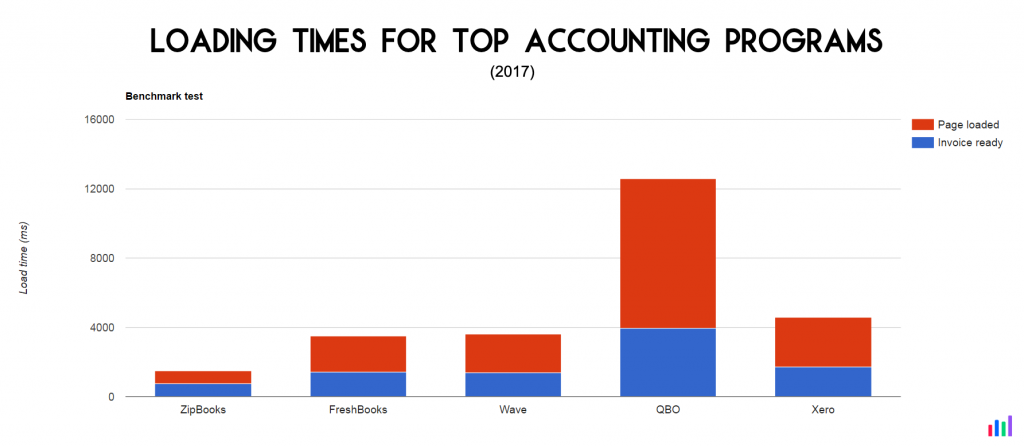
At the time, ZipBooks was the fastest loading accounting site—even compared to big names like FreshBooks and Xero (and QuickBooks Online, who is devastatingly behind). And you better believe we’ve only increased page speeds since then!
Page speed sends a signal to search algorithms and is an important part of SEO—Backlinko completed a study that found page speed plays a major role in VSO as well. According to their findings, the average voice search page loads in 4.6 seconds, which is 52% faster than a standard web page.
If you want to be featured in voice search as well as rank on Google, you need to prioritize page speed as an SEO strategy.
Readability
Using a more conversational tone, as well as straightforward language, will make it easier for voice assistants to find you. In the same study by Backlinko, they found that the average Google voice search result is written at a 9th grade level.
The world of business is already painfully crowded with jargon (something we’re working to change at ZipBooks). While you may feel a need to “talk the talk” in order to be considered a legitimate business, don’t give in to this temptation. Instead, follow Google’s model, and cater to your customers.
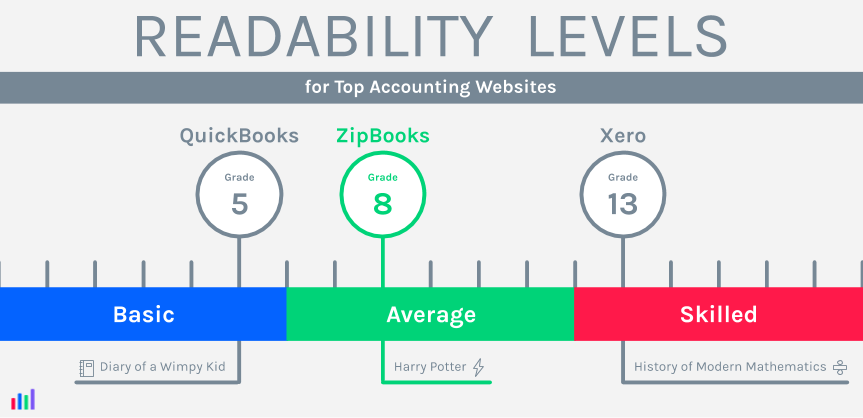
We compared Readability levels of some of the Top Accounting Websites and you can see the disparity. Using too low of a grade level is a bit condescending, while too high of a level is inaccessible. Zipbooks readability lands at Grade 8, which is a good middle ground. Plus, who doesn’t want to be compared to Harry Potter?
Results read over voice search need to be quickly processed and easily understood. You can’t assist your listener with visual reference or other helps, so it’s critical that your point comes across clearly. In other words, not only does your content need to read well, it needs to be spoken well.
Furthermore, improved readability can impact the level of social engagement that your content receives. And while Google has gone on record to say that social signals are not used in their algorithm, Backlinko found a correlation between top voice results and highly shared content.
Link Authority
The authority of your domain tends to be affected by the number of high quality backlinks you have. Google uses this as a ranking signal because it shows that you are trusted by other websites.
Likewise, voice search results are more likely to pull answers from domains with strong authority, rather than untrusted sites. Voice provides a single answer, not a top ten list, meaning that voice assistants need to be extremely confident that they’re giving you the best information. According to Backlinko, Google Home tends to rely on domain authority more than page authority.
The average domain rating in voice search results was 76.8 (as measured on Ahrefs).
You can build up domain authority by improving your backlink profile, consistently producing high quality content, and strengthening website security. (In fact, HTTPS is non-negotiable in both SEO and VSO; Backlinko found that 70% of voice search results use this form of encryption).
Brevity
Short is sweet when it comes to voice search. Backlinko found that the typical voice search result is only 29 words long.
Consumers want to know everything there is about your business and they want to know it as quickly as possible. Think in terms of questions and answers. Be conversational, but not fluffy. Pack every word you write with substance and edit your content for brevity.
The top-cited reason people prefer voice assistants over human interaction is the speed of response—so make sure your pages load quickly and your writing is succinct.
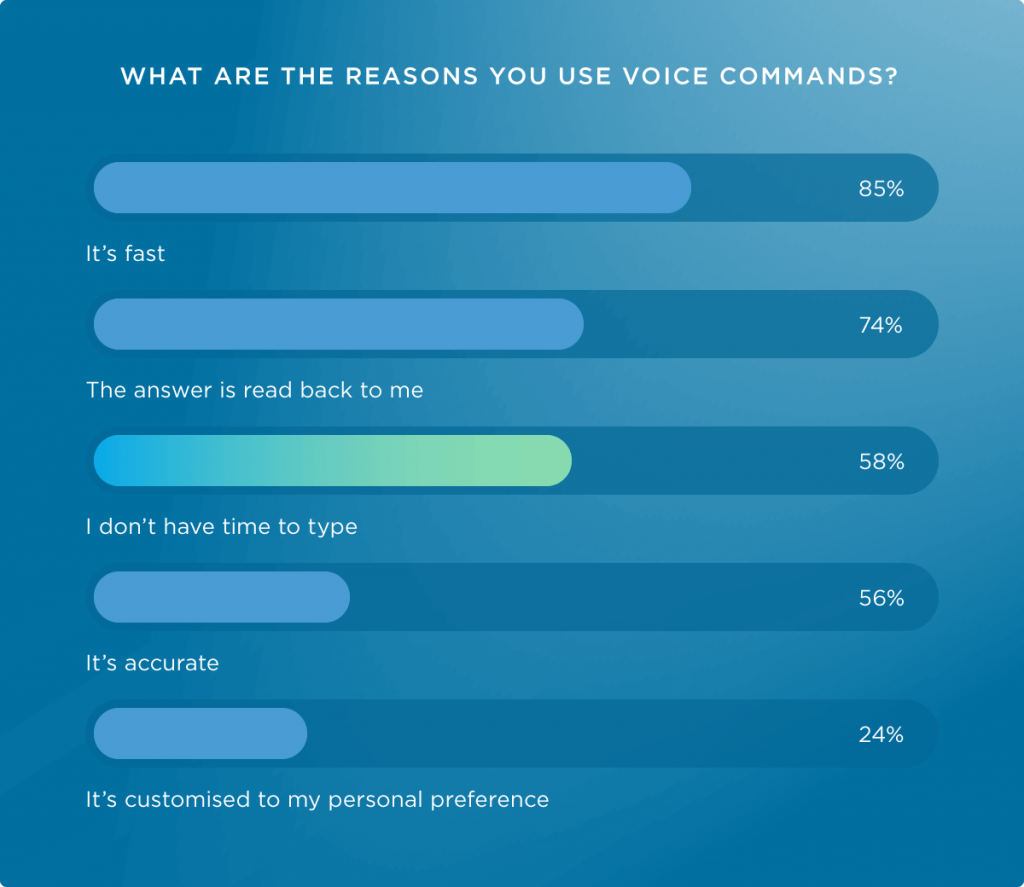
Source: Backlinko
Mobile optimized
Voice search is used almost exclusively on mobile devices, so your website should be mobile-optimized. Your page needs to load quickly and do the work for the search engine.
One SEO tactic that can help with this is schema markup, as it makes your pages more crawlable. (However, while Backlinko found that schema does help overall, it does not play a key role in voice search rankings specifically).
If you’re not sure if your webpage will rank in Google’s mobile first index, consider running a quick free test.
Long-form content
Backlinko found that the average word count of a voice search result page is 2,312 words, far above the content standard. SEO trends are moving towards long-form content as well, favoring quality and quantity alike.
However, writing lengthier content does not broaden the opportunity for keyword stuffing—this practice has been completely eradicated from the SEO playbook. For voice search specifically, Backlinko found that using keywords doesn’t really affect voice search results.
In fact, because spoken queries tend to be longer, it’s less likely that the exact phrase or keyword will be found in an article title. Instead, optimize for long-tail keywords and consider addressing follow-up questions in articles of epic proportion.
The “Zero” Answer
In order to present a better user experience and adapt to voice search, Google has used the “featured snippet” or “zero” spot. This is the search result that appears at the very top of the page—typically in some sort of answer box—before the other standard rankings.
You don’t even have to visit a website to get your answer.
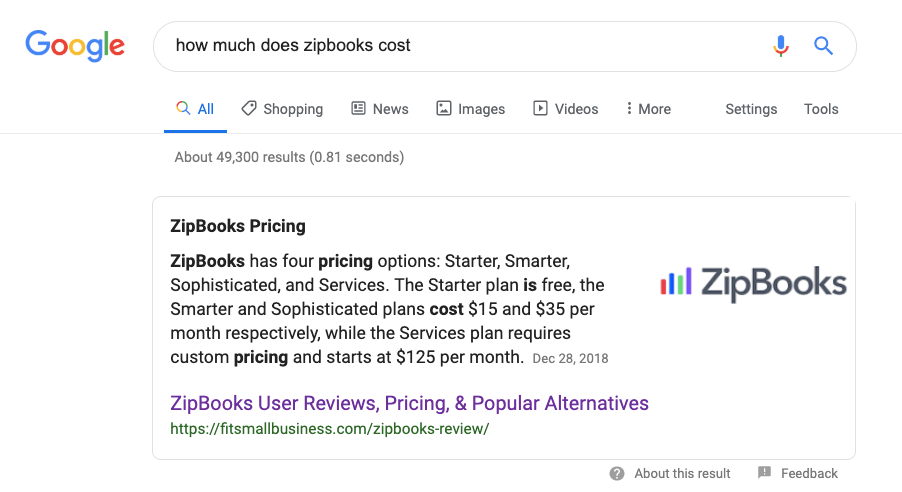
Voice assistants, specifically, depend on theses answer boxes. When users ask a question, they’re only given one answer—not a list of options—so ranking in that zero spot is crucial. In Backlinko’s study, 40% of all voice search answers were pulled from the featured snippet.
Optimizing for the zero answer is a VSO and SEO technique: all users are more likely to trust featured snippet brands as experts in their industry.
High rankings in general have a large impact on voice search results. Of all the queries Backlinko tested, approximately 75% of them ranked in the top 3 results for that search. In other words, the higher a page ranks for a keyword, the more likely Google will give it voice.
Business Listings
Business Listings are one example of content that almost always ranks in the featured snippet. Local business owners looking to improve VSO absolutely must have a Google My Business (GMB) listing.
Google Assistant pulls from GMB listings first when users search for business info or locations “near me.” Most voice assistants will also allow users to call businesses through their platform if that business’s listing is up-to-date. To make sure you’re not missing out on these prospects, claim your business listing on both Google and Bing and update it regularly.
Claiming your GMB listing isn’t hard, but if you don’t claim it, someone else—even a competitor—could claim it for you.
Customer reviews are also an important part of business listings, so don’t neglect your GMB profile. Take the time to respond to all feedback and get rid of fake or spammy reviews.
Pro Tip: ZipBooks helps you to manage all of your business listings in once place, so you can always be found easily on voice search. Learn more.
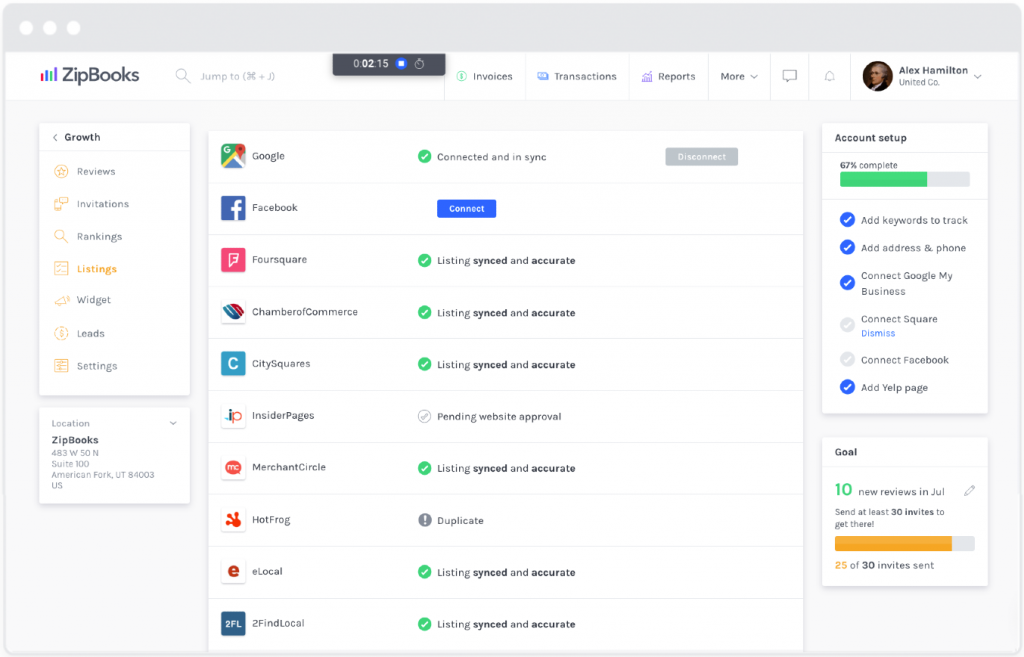
FAQs
Another form of content that shines in voice search results is the FAQ. The format of FAQ pages is ideal for voice search—a question and answer paired together perfectly.
To match voice search structure, craft answers to common questions in a conversational tone. If a voice assistant reads your answer out loud, it should be easy-to-understand, not complex or clunky. Building up a database of FAQs will help voice assistants provide the best results for users (and increase your chances of being found).
“People Also Ask” boxes (PAAs) are often featured in queries as well. If you see PAA boxes for your keywords, create content that answers each of the additional questions, so someone else doesn’t do it for you.
VSO and SEO together
65% of people who own an Amazon Echo or Google Home can’t imagine going back to the days before they had a smart speaker.
Voice assistants are trending right now, and odds are, they aren’t going anywhere. Voice search optimization shouldn’t be your only SEO strategy, but there are many techniques you can use that will help you to optimize for talk and text.





